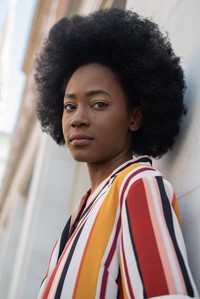Theresa Lola: Happy Here


About Author
Theresa Lola, who has contributed to the Happy Here collection by Black writers and illustrators, is a British Nigerian poet. She won the 2018 Brunel International African Poetry Prize. She was the 2019/2020 Young People's Laureate for London. Her 2019 debut poetry collection is In Search of Equilibrium.
Image by Hayley Madden
Interview
Happy Here: 10 stories from Black British Authors and Illustrators (Knights Of)
August 2021
Happy Here is a celebratory collection of short stories and poems by Black writers and illustrators. Poet Theresa Lola tells us about her contribution, A Good Weekend, which is illustrated by Mohamed Fadera, and tells us why the collection matters.
Q&A with Theresa Lola
1. Can you tell us a little about your writing career to date? Has it been hard to get your voice heard in traditional publishing?
I have been writing since I was about seven years old, but I only took writing up professionally when I was about eighteen. I also began performing, and it has been a journey of embracing different styles and ways of creating and sharing a poem.
I was fortunate to find a community of other writers who were also trying to get their voices heard in traditional publishing, and that support was important in sustaining our perseverance. Even more important were the demand for changes which have brought in active initiatives and responses from publishers, the results of which we were slowly seeing.
2. How did you get involved in the Happy Here collection, why did you want to contribute to it?
I received an email from the editorial director and managing director about Happy Here collection, and I was immediately awed by the idea. Personally, books changed my life as a child, it was a reminder to always believe in my ideas, voice, experiences, and stories.
This collection is special because it's not just one writer or one illustrator, but different Black writers and illustrators with different voices co-existing and harmonising together. I wanted to contribute a poem to Happy Here knowing that children would read this collection and would discover new creative ways they too can share their voices and stamp their presence in the world.
3. What were your guidelines for your contribution?
The guidelines were quite open, it was really about writing a poem that was joyful, full of rhythm, and played with language. I wanted to write a poem where children could believe in the story, one they could recite to each other over lunch, in the playground, on the bus, in a shop!
4. Why did you decide to focus on 'A Good Weekend' for the collection and to write in verse?
The weekends are the days where my best memories took place as a child. It was when everyone felt relaxed, my parents were off work, my mum would plait my hair into new hairstyles, aunties and uncles would visit, music would be playing, and sometimes we would go out for outdoor fun and relaxation.
I chose to write in poetry because it is poetry that has best captured my experiences over the years, poetry is the field where I play with my creativity the most. Given I was writing about play and joy, it felt right to use poetry to do so.
5. Can you tell us about the weekend you've chosen, and why these moments were special for you?
The poem is divided in three sections, The Friday section is about playing games like rock, paper, scissors, with friends. There is something about games that would make even children that don't know each other bond immediately, and I wanted to capture that. The Saturday section follows a child's hair being done by their mother, and I was thinking about my mother who would often plait my hair into different styles on weekends, or would take me to the salon while I watched the mirror eagerly. The Sunday section is about an Aunty and uncle coming to visit and showing off their dance moves. I was thinking about my uncles and aunties who would visit and at some point sing their favourite songs and break out into dance moves, and the children in the room would watch, and realise the generational differences in dance moves. I wanted to celebrate these moments of extended joy, laughter and learning.
6. What did you think of the illustrations by Mohamed Fadera?
I loved his illustrations! I particularly loved the range of hairstyles he gave the girls, and it reminded me of when I was a child and most weekends my hair would be styled into a new pattern. I also loved how the illustrations captured the joys in our fondest moments, like the illustration of the uncle and aunty dancing.
7. What would you like children to take from the collection?
I would like children to learn that there are many ways and techniques they can use to write about their own stories. All the writers featured in the Happy Here collection have their own unique voices and styles, and I hope this inspires children to explore their creative potential.
8. Do you feel that books like Happy Here can inspire change in what is published in the UK and elsewhere?
I think all it takes is one book to open the closed gates, and I have hope that Happy Here would be that book to further prove how important a diversity of voices is.
9. What are you working on currently?
I'm currently writing as always, soon the work will take shape into something worth sharing.
 Happy Here: 10 stories from Black British Authors and Illustrators
Happy Here: 10 stories from Black British Authors and Illustrators
